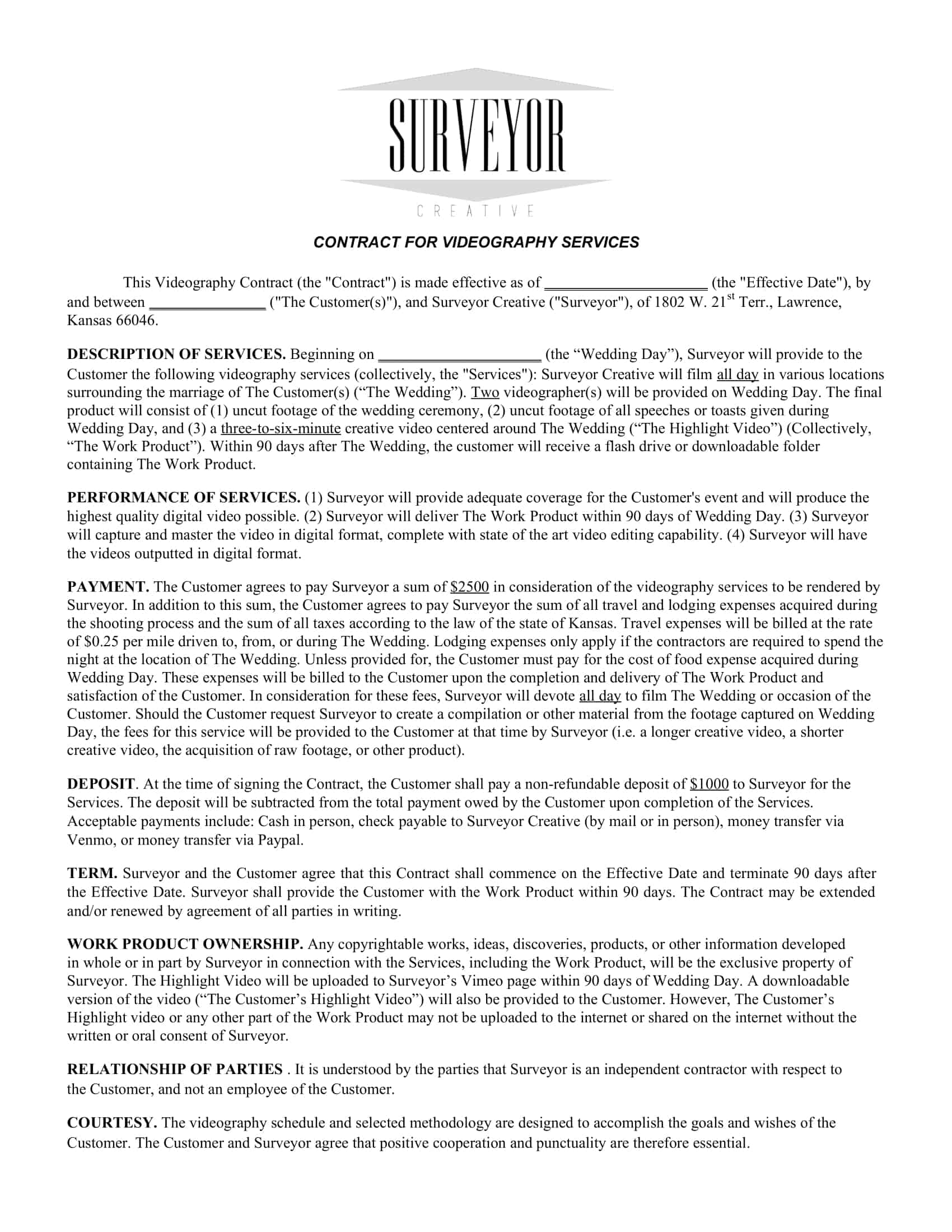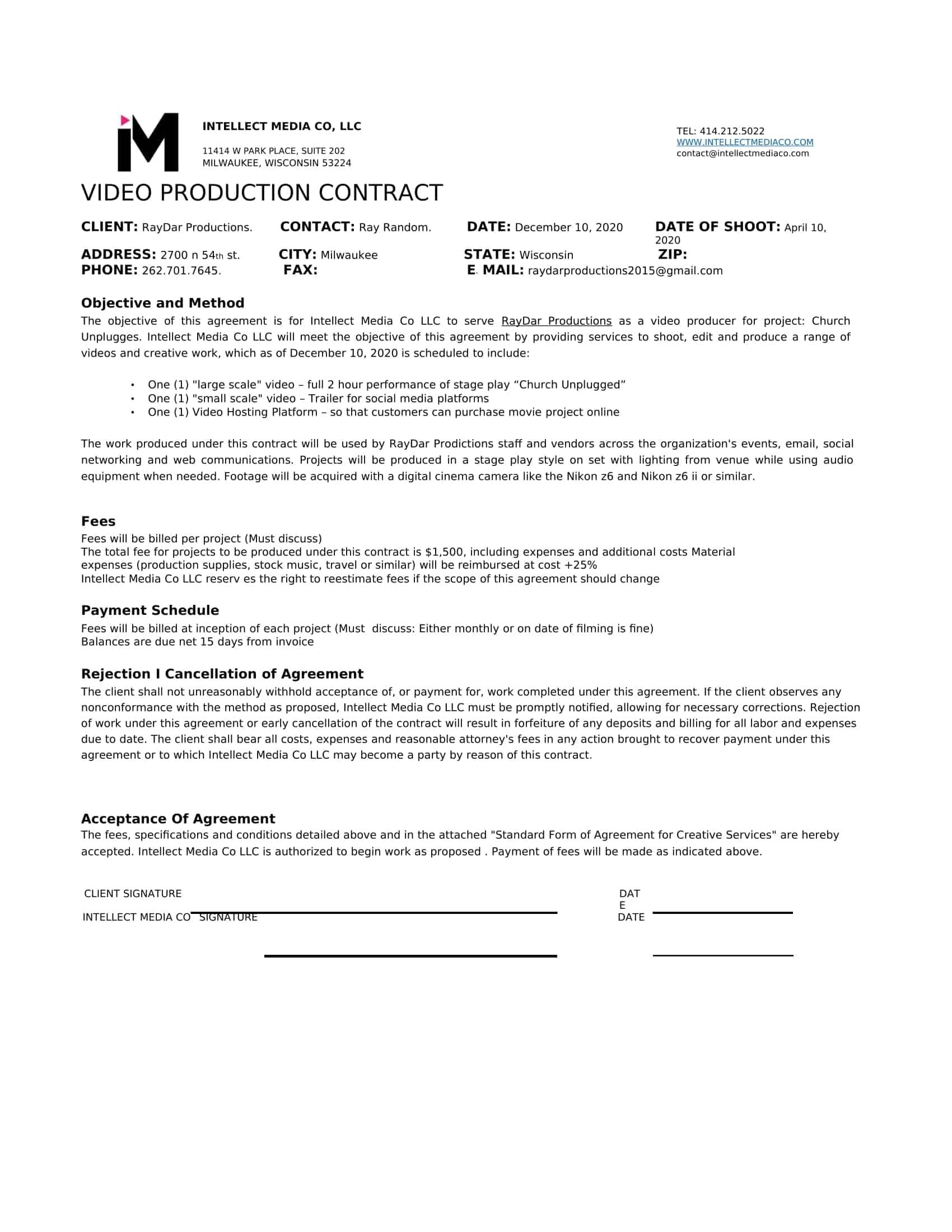Photography is an art form that has been around for over a century, and with the advancement of technology, videography has now become an integral part of our daily lives. Just like photographers, videographers are professionals who provide different types of video shooting services to their clients. These services can range from filming brand documentaries, covering events, showcasing products, to producing films.
However, before any work is done, it is essential to establish clear terms and conditions between the client and the videographer. This is where a videography services agreement comes into play. The agreement outlines the scope of services, the deliverables, and the conditions of the project. It is a legally binding document that protects both the videographer and the client, ensuring that the project runs smoothly and effectively.
Table of Contents
Videography Contract Templates
Capture and preserve precious moments with confidence using our comprehensive collection of Videography Contract Templates. A videography contract is a legally binding agreement between a videographer and a client that outlines the terms and conditions of a videography project. Our customizable and professionally designed templates provide a clear and detailed framework for defining project scope, deliverables, timelines, payment terms, and rights and permissions.
Whether you’re a professional videographer or a client seeking videography services, our templates offer a user-friendly format to ensure mutual understanding and protection of both parties’ interests. By utilizing our Videography Contract Templates, you can establish clear expectations, prevent misunderstandings, and safeguard your rights throughout the project. With our customizable templates, you can tailor the contract to suit your specific project requirements and industry standards. Simplify the contracting process, enhance professionalism, and embark on your videography project with confidence using our versatile and user-friendly Videography Contract Templates. Download now and ensure a smooth and successful videography collaboration.
What is a videography contract?

A videography contract, also known as a videography services agreement, is a legally binding document that outlines the terms and conditions of a video production project between a videographer and their client. This contract serves as a written agreement that protects both parties by setting clear expectations, ensuring a mutual understanding of the services to be provided, and avoiding misunderstandings or disputes.
The videography contract typically includes details such as the scope of work, payment terms, production schedule, equipment requirements, intellectual property ownership, liability and insurance, and any other relevant terms and conditions agreed upon by both parties. It is important for both the videographer and the client to carefully review and understand the terms of the contract before signing it to ensure that both parties are on the same page and that the project runs smoothly and effectively.
Why is a video production contract important?
A video production contract, also known as a videography services agreement, is an essential document for any video production project, as it serves as a legally binding agreement between the videographer and the client.
Here are some reasons why a video production contract is important:
Clarifies expectations: The contract outlines the scope of work, project timeline, and other key details, which helps both parties to have a clear understanding of the project’s expectations.
Protects the videographer and client: A video production contract helps to protect both the videographer and the client by clearly stating the terms and conditions of the project, including payment terms, project timeline, intellectual property ownership, and liability.
Prevents misunderstandings: A contract ensures that both parties are on the same page regarding the scope of work and project deliverables, which helps to prevent misunderstandings and disputes that can arise during or after the project.
Sets clear payment terms: The contract includes payment terms, which ensures that the videographer is paid for their services and that the client understands the payment schedule.
Establishes legal rights: A video production contract establishes legal rights and obligations for both parties, which can help to avoid legal issues in case of a dispute.
Why you need a videography contract
A videography contract is a legal agreement between a videographer and a client that outlines the terms and conditions of a video production project. Here are some reasons why a videography contract is essential for both parties:
Clear communication: A videography contract provides a clear and concise outline of the scope of work, timelines, deliverables, and payment terms. This helps to ensure that both parties are on the same page and understand their respective obligations and expectations.
Legal protection: A videography contract protects both the videographer and the client by establishing legal rights and responsibilities. The contract can include provisions related to copyright, ownership of the footage, liability, insurance, and dispute resolution.
Payment security: A videography contract can include payment terms and conditions, such as payment schedule, payment method, and late payment fees. This helps to ensure that the videographer is paid for their work, and that the client is aware of their payment obligations.
Quality assurance: A videography contract can specify the quality standards for the video production project, including the use of specific equipment, editing techniques, and post-production processes. This helps to ensure that the final product meets the expectations of both parties.
Professionalism: A videography contract demonstrates the professionalism of the videographer and the seriousness of the project. It establishes a formal and legally binding relationship between the videographer and the client, which can help to build trust and credibility.
What should be included in a videography contract?
A videography contract is an important legal document that outlines the terms and conditions of a video production project between a videographer and their client. Here are some important elements that should be included in a videography contract:
Project description: A description of the project, including the scope of work, the type of video to be produced, and any other relevant details.
Production schedule: A detailed timeline that outlines the production schedule, including key dates for pre-production, production, and post-production.
Deliverables: A list of the final deliverables, including the format of the video and any other related assets, such as raw footage and audio files.
Payment terms: A clear description of the payment terms, including the total cost of the project, the payment schedule, and any late fees or penalties for missed payments.
Intellectual property: A statement regarding the ownership of the intellectual property, including copyrights and any other rights related to the video.
Cancellation policy: A clear statement outlining the cancellation policy, including any fees or penalties that may apply if the project is cancelled.
Liability and insurance: A description of the videographer’s liability and insurance policies, including any limitations of liability and insurance requirements.
Termination clause: A statement outlining the circumstances under which the contract may be terminated, including the obligations of both parties in the event of termination.
Governing law: A statement that identifies the governing law that applies to the contract and any disputes that may arise from it.
Signatures: Signatures from both the videographer and the client, indicating that they have read and agreed to the terms of the contract.
How to write a video production contract
Here is a step-by-step guide on how to write a video production contract. Please note that this guide is not a substitute for legal advice and that you should always consult with a lawyer or other qualified professional when drafting a contract.
Step 1: Define the Parties
The first step in writing a video production contract is to define the parties involved in the project. This includes the videographer or production company and the client. Make sure to include the legal names and contact information of both parties.
Step 2: Outline the Scope of Work
The next step is to outline the scope of work. This should include a detailed description of the video production project, including the purpose of the video, the shooting location, the duration of the shoot, and any other relevant details. Be as specific as possible to avoid any misunderstandings or disputes later on.
Step 3: Define Deliverables
In this step, you should define the deliverables for the video production project. This includes the final product, which could be a video file, DVD, or other format. You should also include any intermediate deliverables, such as rough cuts, and specify the format and quality of the deliverables.
Step 4: Establish Timelines
Establish timelines for the project, including the start and end dates for the shoot and the post-production process. This will help to ensure that both parties are aware of the project’s timeline and can plan accordingly.
Step 5: Specify Payment Terms
Specify the payment terms, including the total fee, payment schedule, and payment method. You should also include any late payment fees or other penalties for non-payment. Make sure to be as clear as possible to avoid any misunderstandings or disputes over payment.
Step 6: Establish Copyright Ownership and Usage Rights
Establish copyright ownership and usage rights for the final product. This should include a clause that specifies who owns the copyright to the video and how it can be used. You should also specify any restrictions on the usage of the video, such as limiting it to a certain geographic region or audience.
Step 7: Specify Liability and Insurance
Include a liability and insurance clause that outlines the responsibilities of both parties in case of accidents, injuries, or damages during the production process. You should also specify the types of insurance that are required and who is responsible for obtaining and maintaining the insurance.
Step 8: Include a Dispute Resolution Clause
Include a dispute resolution clause that outlines the steps to be taken in case of a dispute between the videographer and the client. This could include mediation, arbitration, or going to court. Make sure to be as specific as possible to avoid any confusion or misunderstandings.
Step 9: Define Termination Terms
Define the terms of termination for the contract, including the circumstances under which either party can terminate the contract and any penalties or fees associated with termination. This will help to protect both parties in case the project is not completed for any reason.
Step 10: Review and Sign
Finally, make sure to review the contract carefully and make any necessary changes or additions. Once both parties are satisfied with the contract, it should be signed and dated by both parties to make it legally binding.
FAQs
What should I do if the client wants to make changes to the contract?
If the client wants to make changes to the contract, you should review the proposed changes carefully and negotiate with the client to find a mutually acceptable solution. It’s important to ensure that the revised contract reflects the agreed-upon terms and conditions of the project.
What should I do if the client breaches the contract?
If the client breaches the contract, you should refer to the terms of the contract and the governing law to determine the appropriate course of action. This may include negotiating a resolution with the client, pursuing legal action, or terminating the contract.
When should I get the client to sign the contract?
It’s best to get the client to sign the contract before any work is done on the project. This helps to ensure that both parties are on the same page and that the project runs smoothly and effectively.
Do I need a lawyer to help me draft my videography contract?
While it’s not necessary to have a lawyer draft your videography contract, it’s always a good idea to consult with a legal professional to ensure that your contract is legally sound and covers all the important details of the project.
Can I use a template for my videography contract?
Yes, you can use a template as a starting point for your videography contract. However, it’s important to customize the template to reflect the specific details of your project and to ensure that the contract covers all the important terms and conditions.
What happens if the client wants to cancel the project after signing the contract?
If the client wants to cancel the project after signing the contract, you should refer to the cancellation policy in the contract and any applicable laws or regulations. Depending on the circumstances, the client may be required to pay a cancellation fee or other penalties.
How can I ensure that my videography contract is legally binding?
To ensure that your videography contract is legally binding, it’s important to include all the necessary legal elements, such as consideration (payment), a clear offer and acceptance, and signatures from both parties. You should also ensure that the contract complies with any applicable laws or regulations.
How long should my videography contract be?
The length of your videography contract will depend on the scope and complexity of the project. However, it’s important to ensure that the contract covers all the important terms and conditions, even if this means that the contract is longer.
Can I make changes to the contract after the client has signed it?
It’s generally not recommended to make changes to the contract after the client has signed it, as this can undermine the legal validity of the contract. However, if changes are necessary, you should discuss them with the client and ensure that the revised contract reflects the agreed-upon terms and conditions.
What should I do if the client refuses to sign the contract?
If the client refuses to sign the contract, you should discuss the reasons for their refusal and try to address any concerns or issues they may have. If the client still refuses to sign, you may need to consider whether to proceed with the project or to seek other clients.








































![Free Printable Roommate Agreement Templates [Word, PDF] 1 Roommate Agreement](https://www.typecalendar.com/wp-content/uploads/2023/06/Roommate-Agreement-150x150.jpg)
![Free Printable Land Contract Templates [Word, PDF] Simple 2 Land Contract](https://www.typecalendar.com/wp-content/uploads/2023/05/Land-Contract-1-150x150.jpg)
![Free Printable Credit Card Authorization Form Templates [PDF, Word, Excel] 3 Credit Card Authorization Form](https://www.typecalendar.com/wp-content/uploads/2023/06/Credit-Card-Authorization-Form-150x150.jpg)
